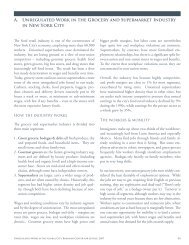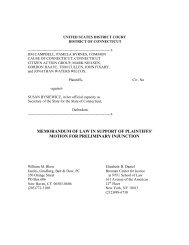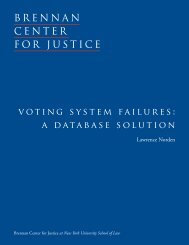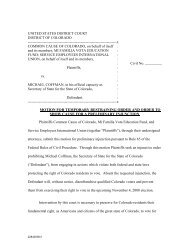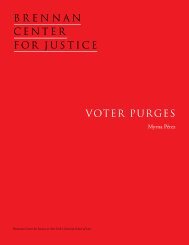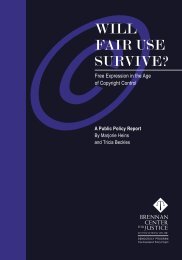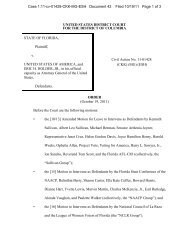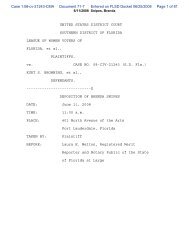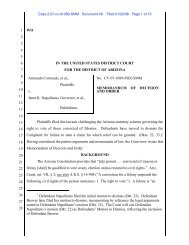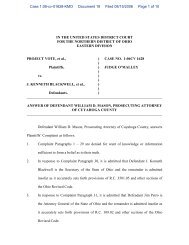Motion to Dismiss - Brennan Center for Justice
Motion to Dismiss - Brennan Center for Justice
Motion to Dismiss - Brennan Center for Justice
Create successful ePaper yourself
Turn your PDF publications into a flip-book with our unique Google optimized e-Paper software.
12345678910111213141516171819202122232425262728Arizona’s Legislature long ago made a policy choice about the financialpenalties that may be imposed as a result of a felony conviction. Similarly, the peopleof Arizona, in adopting the Victims Bill of Rights, made a policy choice that personsconvicted of crimes—not their victims—should pay <strong>for</strong> the economic losses directlycaused by that criminal conduct. See Ariz. Const. art. 2 § 2.1(8). Requiring personswho nonetheless choose <strong>to</strong> engage in that conduct <strong>to</strong> complete all of their sentencebe<strong>for</strong>e res<strong>to</strong>ring their civil rights is rationally related <strong>to</strong> Arizona’s interest in deterringcrime, punishing crime, and compensating societal victims of their crime. E.g.,Madison, 2007 WL 2128346, at *12 (“The State clearly has an interest in ensuring thatfelons complete all of the terms of their sentence, and there is no requirement that theState res<strong>to</strong>re voting rights <strong>to</strong> felons until they do so.”).Moreover, states have a legitimate interest in regulating the franchise, includingdetermining the qualifications of voters. E.g., Richardson, 418 U.S. at 53 (noting thatstates may consider a person’s criminal record in determining voter qualifications);Green v. Bd. of Elections of the City of New York, 380 F.2d 445, 451-52 (2d Cir. 1967)(discussing the his<strong>to</strong>rical justifications <strong>for</strong> disenfranchising criminals); Madison, 2007WL 2128346, at *12 (states have an interest “in limiting political participation of thoseunwilling <strong>to</strong> abide by laws and in requiring the completion of all sentence elementsbe<strong>for</strong>e the right <strong>to</strong> vote is res<strong>to</strong>red”).Under Richardson, felons have no right <strong>to</strong> vote if the state chooses <strong>to</strong> removethat right. Accordingly, there can be no equal protection problem with Arizona’spolicy decision <strong>to</strong> require felons <strong>to</strong> complete their sentences be<strong>for</strong>e res<strong>to</strong>ring their civilrights. Moreover, even if an equal protection claim was viable, it fails here becauseArizona plainly has a legitimate interest served by its civil rights res<strong>to</strong>ration process.Accordingly, the Court should dismiss Plaintiffs’ equal protection claim based on thefailure <strong>to</strong> pay financial penalties.B. Arizona’s Civil Rights Res<strong>to</strong>ration Law Is Not a Poll Tax.Plaintiffs assert that Arizona’s civil rights res<strong>to</strong>ration process amounts <strong>to</strong> a polltax prohibited by the Twenty-Fourth Amendment and the Voting Rights Act, 42 U.S.C.Case 2:07-cv-01089-SMM Document 22 8 Filed 08/13/2007 Page 8 of 18




![Download the Letter [PDF] - Brennan Center for Justice](https://img.yumpu.com/50139248/1/190x245/download-the-letter-pdf-brennan-center-for-justice.jpg?quality=85)
